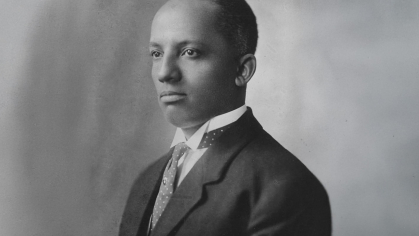Why Are All Eyes on the New Jersey Governor’s Race?

New Jersey is one of two states that will be electing a new governor this November, along with Virginia. Both races are attracting national attention and speculation about what the results could mean on a national level.
Democrat Mikie Sherrill and Republican Jack Ciattarelli will face off for a second time in a gubernatorial debate hosted by Bloustein School of Planning and Public Policy at New Brunswick Performing Arts Center on Wednesday, Oct. 8. In advance of the debate, we asked Kristoffer Shields, director of the Eagleton Center on the American Governor, about our state’s historic trends, shifts in voter registration and the issues shaping New Jersey’s race.
How significant are national political trends in shaping the outcome of New Jersey’s gubernatorial race and other state-level elections this year? Why do people think the results of these races will be telling on a national level?
Because New Jersey and Virginia are the only two states to hold gubernatorial elections the year after a presidential election, we always get a lot of national attention. It is the first big opportunity for voters to go to the polls and register their feelings about the new presidential administration. It’s common, then, for people to consider the New Jersey result a bellwether for what is to come in next year’s midterms. And there is some truth to that, but it can also often be overstated. Certainly, both candidates have tried to nationalize this race to some extent, but most of the issues that voters indicate mean the most to them (affordability, housing, education, and taxes to name a few) are state issues. These are the issues that impact New Jerseyans most deeply.
New Jersey is often perceived as a blue state, but its gubernatorial elections can be competitive. Are there competing historical patterns at play this year?
New Jersey is indeed often seen as a blue state, but that is not really true at the gubernatorial level. New Jersey Republicans have frequently run for governor successfully in New Jersey, most recently Chris Christie who served for two terms right before Phil Murphy. In fact, neither party has held the New Jersey governorship for more than two consecutive terms since the mid-1970s. That said, it is also a trend in New Jersey that the party that wins the presidential election the previous year tends to lose the New Jersey gubernatorial race the following year. This isn’t always the case – four years ago, for example, is an exception. But especially in an open race, the party out of national power usually has an enthusiasm advantage in New Jersey, which would be an advantage for the Democrats. Neither of these trends is determinative and some of them are just coincidence. But this year, something has to give.
New Jersey has seen recent Republican voter registration gains. Is this a temporary trend or a sign of a more fundamental shift in the state's political makeup?
This is a key question that may in part be answered by this gubernatorial race, as well as this year’s Assembly races. Election results in the past few cycles have shown a pretty clear move to the right in New Jersey. And while I don’t think many people expect the Assembly majority to change parties, we will all be watching to see if New Jersey Republicans can continue their recent trend of both registration and electoral gains. In particular, if the Republicans recapture the governor’s seat, they can make a strong case that this is, in fact, a significant trend. On the other hand, political winds can change quickly and if the Democrats are able to win this gubernatorial race comfortably, then they will be able to claim that the recent gains were temporary. The stakes are fairly high for both sides.
Regardless of who wins, what will be the most significant policy challenges facing the new governor when they take office in January?
There are plenty! Certainly, anything involving state finances – the budget, taxes, and the whole package of affordability issues in New Jersey – will be at the top of the list. Affordability really is the key issue of the race and voters are going to demand that whoever wins has a plan to make New Jersey a less expensive place to live. But that definitely isn't all: affordable housing, education funding, NJ Transit and other transportation issues, and climate issues will all have to be part of the new governor’s agenda. It will not be an easy job for whoever wins.
What do you expect will be the national takeaways from this race, and how will they influence party strategy in other states?
Certainly, the media will be watching the race closely and will try to use it to make predictions about next year’s races. But perhaps more important, future candidates in New Jersey and elsewhere will also be watching. There are a lot of political questions right now for both parties: what is the role of Donald Trump in state and local elections? Can Democrats unify the more moderate and progressive parts of the party enough to drive strong turnout? Many people will be watching closely to see what works and what doesn’t for these candidates, especially in the context of the Virginia race as well as the New York City mayoral race.


